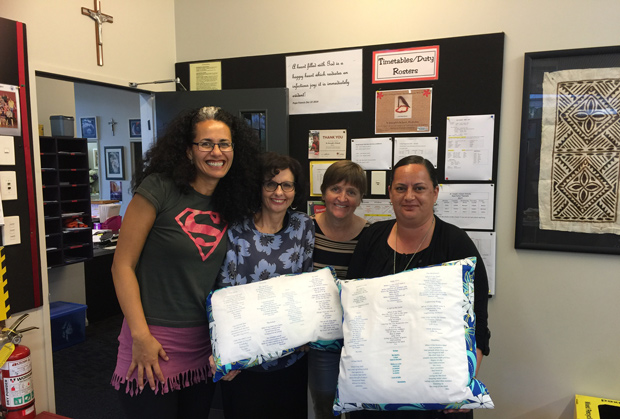Growing Pasifika Niu Leaders

Here's some of the first 'Growing Pasifika Niu Leaders' cohort (Capability Group and Vector). 'Niu' is the pan-Pacific word for coconut palm. Right to left: Ronnie Seumanu, Lynette Reed, Jo Lepua, Angelik Singh, Tom Kavaliku, Pat Masina, Taliilagi Sagala, Eseta Tonutonu, Henry Gray. Absent: Hadleigh Pouesi, Trevor Aumua, Nora Ape.
'A right to write'
Sir Ken Robinson's book The Element, mentioned in one of the most downloaded Ted Talks of all time 'Do Schools Kill Creativity?', defines how we are in our element when our 'work' is built at the crossroads of passion and skill.
When, as part of a leadership programme, I walk into the corporate sector and introduce Pasifika leaders in middle management positions to poetry, they are ripe for the picking! Their eyes typically gloss over. They ask, to riff off Tina Turner's famous anti-love song, 'What's Poetry got to do with it?' My answer: everything.
And that's not just because of who I am or what I teach at Auckland University (Pacific Poetry, Creative Writing, Postcolonial Literature).
It's not just because:
- of the astronomical demand in the corporate sector for poets like California's Poet Laureate, Dana Goia, whose 1991 essay Can poetry matter? garnered international attention in the business world, or
- of the phenomenal demand for poet/philosopher David Whyte who comes to Aotearoa New Zealand at the end of the year, or
- Oxford academic Clare Morgan's book What poetry brings to business is a bestseller.
It's because, like the millions of creatives who follow Julia Cameron's creative recovery programme The artist's way, I believe that everyone has the 'right to write'. Everyone has a voice, an identity, a mission statement, a person mandate, a vision and dream for their life and the impact they might have on others and the environment. I stumbled into mine in 1996.
My right to write
I was a year into my PhD on First Wave Pacific Women Poets under the supervision of Professors Albert Wendt and the irreplaceable Professor Terry Sturm, in addition to the interested eye of Witi Ihimaera and the critical largess of Professor Vilsoni Hereniko at the University of Hawai'i (I studied there for 2 years under a Fulbright Travel Scholarship).The year before that though, I found myself on a plane flying to Honolulu to present at my first international academic conference: Inside Out: Theorizing Pacific Literature.
I was freaking out. I was 22 years old and would be speaking in front of the first wave of Pacific poets and literary scholars, including the formidable Haunani-Kay Trask (Hawai'i), Nora Vagi Brash (Papua New Guinea), and Konai Helu Thaman (Tonga).
I felt the tight confines of the economy seat pressing in on my 6-foot frame. Who the hell did I think I was? Samoans have a phrase for those young 'uns who overstep the mark, teasing overreachers back into place: 'moe pi' — bed-wetters. Who did I think I was, to tell these people what they were doing in their poems and how we might be reading them, and what innovations their work offered the field of poetry written in English? Who did I think I was? And then, it came. Like golden syrup on a pikelet, a reminder, a line, then a pouring out of a poem:
Tusitala
teller of tales
that I never heard
till yesterday
born away
for another life.
Today
the tale I tell
is theirs
and yours
a way of seeking
some more
of
Samoa
of my sacred centre.
Today
the tale I tell
will book its way
through tongued histories
sanctioned mysteries
spaces of silence
timeless lives.
Tala tusi
tell the book
word the spirit of brown
in theory
in creativity
we make our sound
renown.
Tusitala is my Tuvaluan grandfather's name. This poem reminds me, and tells others, where I come from, where I am, and where I'm going. It has stayed relevant for over 2 decades. It is both legacy and prophecy. I wrote about this experience for The New Zealand Book Council Lecture in 2016.
That's the magic poetry can offer. It's something that leaders I've worked with for the past 7 years have found empowering. We work together, in a curious mixture of creativity and leadership philosophy; amidst talk of the power of rhythmic and rhyming language and collaborative team management; of the curiosity created by concrete over abstract language and courageous conversations. I've seen Poetry crack the hardest (coco)nuts, and pour out the sweetest juices.
Poetry in motion and as voice
Eseta is a minority — she works for North Power and is their ONLY woman power line manager. Yep, she manages and fixes the power lines when our power goes out — she's amazing, as is her poem painted on her vision board!
Each Pasifika Niu leader is challenged to think of an object that best represents them now — a metaphor to carry their identity. Eseta's was a conch shell, one she brought and blew through at our next meeting. We witnessed poetry in motion and poetry as a vehicle for voice!

 St Joseph's poetry cushions
St Joseph's poetry cushions Anne, Selina, Liz, and the Celebration Board
Anne, Selina, Liz, and the Celebration Board
 Ladies' Litera-Tea holding the Matua Tokotoko
Ladies' Litera-Tea holding the Matua Tokotoko